Peugeot Expert Tepee 2011 User Guide
Manufacturer: PEUGEOT, Model Year: 2011, Model line: Expert Tepee, Model: Peugeot Expert Tepee 2011Pages: 268, PDF Size: 9.78 MB
Page 11 of 268
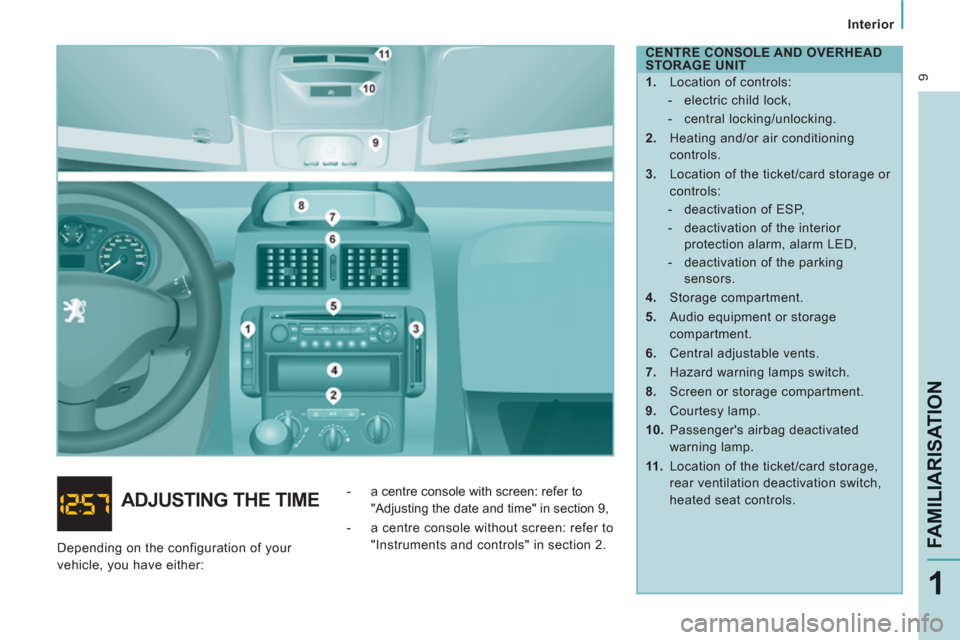
9
Interior
FAMILIARISATIO
N
1
CENTRE CONSOLE AND OVERHEAD
STORAGE UNIT
1.
Location of controls:
- electric child lock,
- central locking/unlocking.
2.
Heating and/or air conditioning
controls.
3.
Location of the ticket/card storage or
controls:
- deactivation of ESP,
- deactivation of the interior
protection alarm, alarm LED,
- deactivation of the parking
sensors.
4.
Storage compartment.
5.
Audio equipment or storage
compartment.
6.
Central adjustable vents.
7.
Hazard warning lamps switch.
8.
Screen or storage compartment.
9.
Courtesy lamp.
10.
Passenger's airbag deactivated
warning lamp.
11 .
Location of the ticket/card storage,
rear ventilation deactivation switch,
heated seat controls.
ADJUSTING THE TIME
- a centre console with screen: refer to
"Adjusting the date and time" in section 9,
- a centre console without screen: refer to
"Instruments and controls" in section 2.
Depending on the configuration of your
vehicle, you have either:
Page 12 of 268
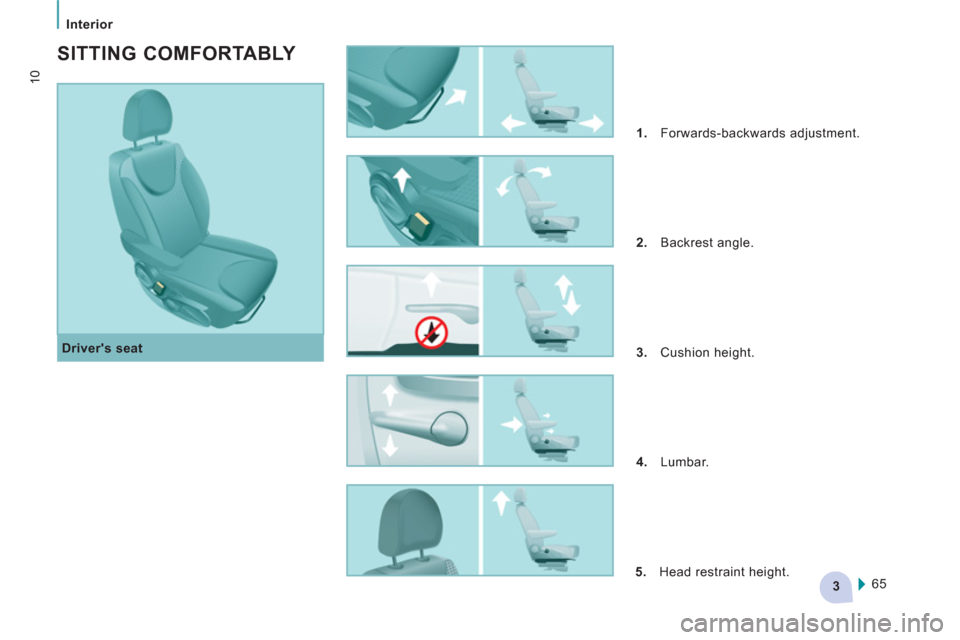
3
Interior
10
Driver's seat
SITTING COMFORTABLY
1.
Forwards-backwards adjustment.
2.
Backrest angle.
3.
Cushion height.
4.
Lumbar.
5.
Head restraint height.
65
Page 13 of 268
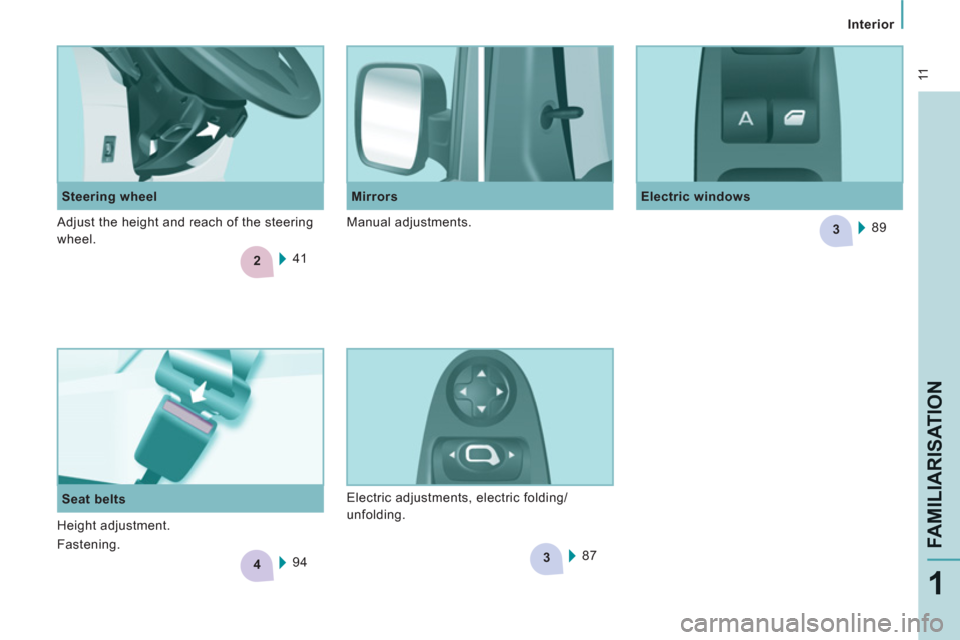
2
4
3
3
11
Interior
FAMILIARISATIO
N
1
Steering wheel
Electric windows
Mirrors
41
Seat belts
94 89
87 Adjust the height and reach of the steering
wheel. Manual adjustments.
Electric adjustments, electric folding/
unfolding.
Height adjustment.
Fastening.
Page 14 of 268
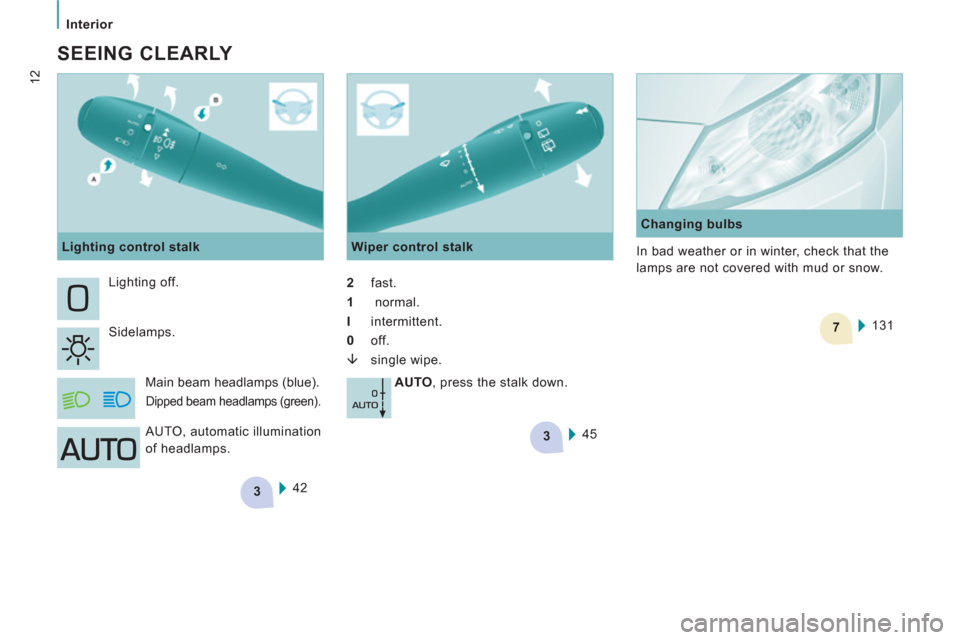
3
3
7
Interior
12
SEEING CLEARLY
42 Lighting off.
Sidelamps.
Main beam headlamps (blue).
Dipped beam headlamps (green).
Wiper control stalk
2
fast.
1
normal.
I
intermittent.
0
off.
�
Page 15 of 268
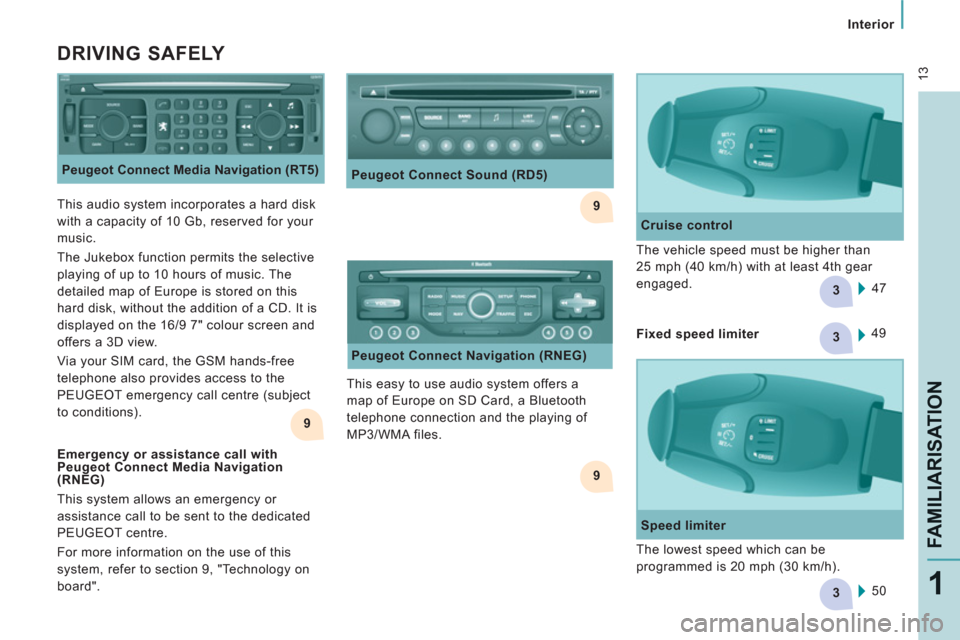
9
9
3
3
9
3
13
Interior
FAMILIARISATIO
N
1
Peugeot Connect Media Navigation (RT5)
DRIVING SAFELY
Cruise control
47 The vehicle speed must be higher than
25 mph (40 km/h) with at least 4th gear
engaged.
50
Speed limiter
The lowest speed which can be
programmed is 20 mph (30 km/h). This audio system incorporates a hard disk
with a capacity of 10 Gb, reserved for your
music.
The Jukebox function permits the selective
playing of up to 10 hours of music. The
detailed map of Europe is stored on this
hard disk, without the addition of a CD. It is
displayed on the 16/9 7" colour screen and
offers a 3D view.
Via your SIM card, the GSM hands-free
telephone also provides access to the
PEUGEOT emergency call centre (subject
to conditions).
Peugeot Connect Sound (RD5)
This easy to use audio system offers a
map of Europe on SD Card, a Bluetooth
telephone connection and the playing of
MP3/WMA files.
Peugeot Connect Navigation (RNEG)
Emergency or assistance call with
Peugeot Connect Media Navigation
(RNEG)
This system allows an emergency or
assistance call to be sent to the dedicated
PEUGEOT centre.
For more information on the use of this
system, refer to section 9, "Technology on
board".
Fixed speed limiter 49
Page 16 of 268
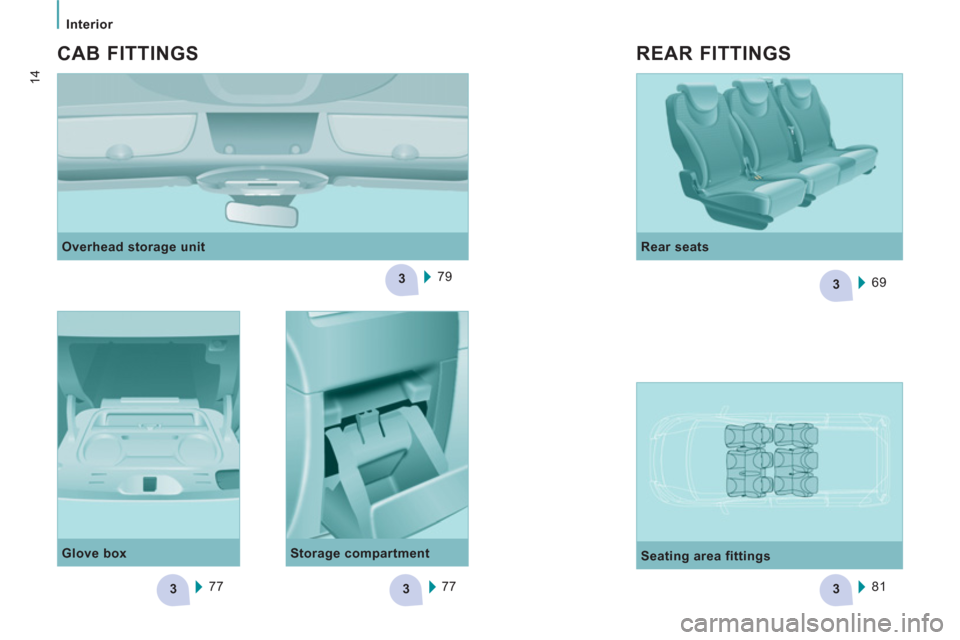
33
3
3
3
Interior
14
Overhead storage unit
79
CAB FITTINGS
Glove box
77 77
Storage compartment
Rear seats
69
Seating area fittings
81
REAR FITTINGS
Page 17 of 268
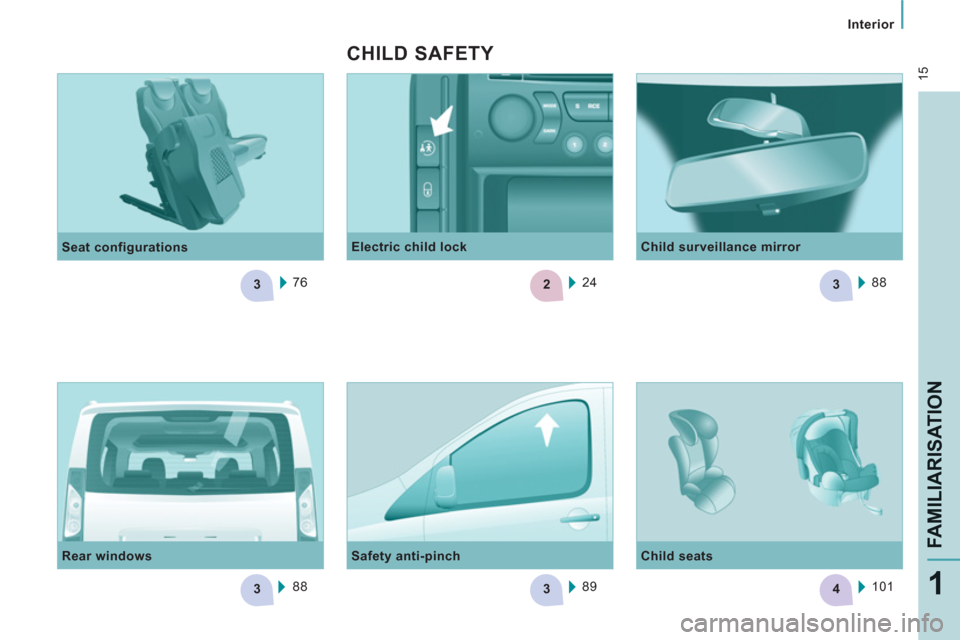
3
33
23
4
15
Interior
FAMILIARISATIO
N
1
76
Seat configurations
88
Rear windows
Safety anti-pinch
89
Electric child lock
24
CHILD SAFETY
Child surveillance mirror
88
Child seats
101
Page 18 of 268
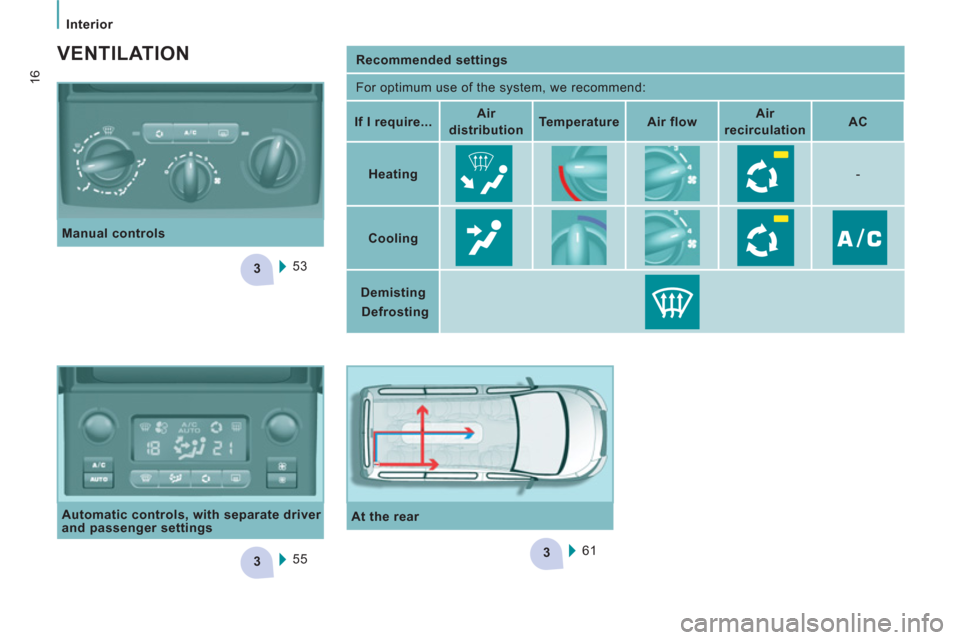
3
33
Interior
16
Recommended settings
For optimum use of the system, we recommend:
If I require...
Air
distribution
Temperature
Air flow
Air
recirculation
AC
Heating
-
Cooling
Demisting
Defrosting
Manual controls
53
Automatic controls, with separate driver
and passenger settings
55
At the rear
61
VENTILATION
Page 19 of 268
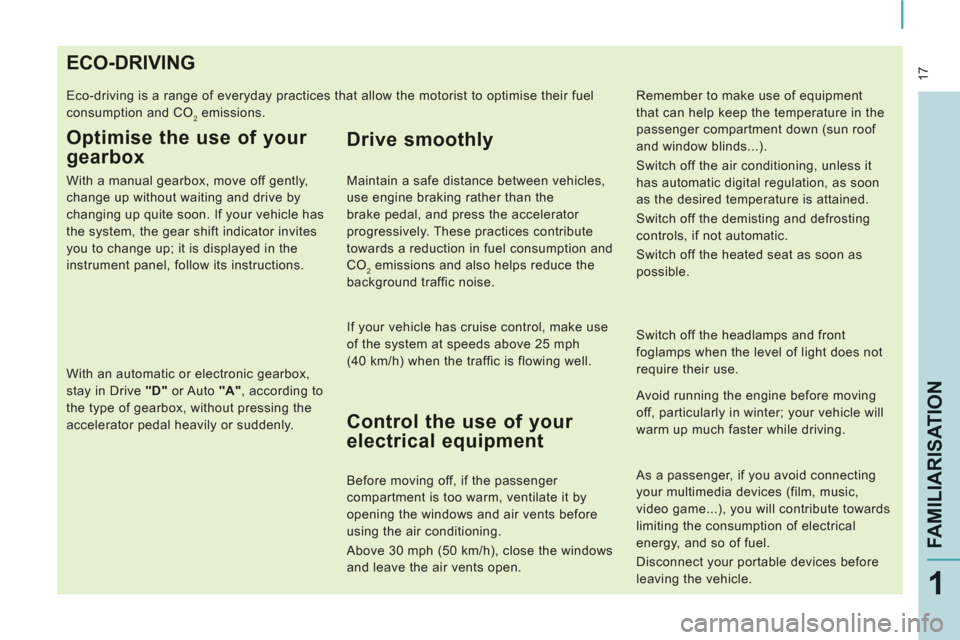
17
FAMILIARISATIO
N
1
ECO-DRIVING
Eco-driving is a range of everyday practices that allow the motorist to optimise their fuel
consumption and CO
2 emissions.
Optimise the use of your
gearbox
With a manual gearbox, move off gently,
change up without waiting and drive by
changing up quite soon. If your vehicle has
the system, the gear shift indicator invites
you to change up; it is displayed in the
instrument panel, follow its instructions.
With an automatic or electronic gearbox,
stay in Drive "D"
or Auto "A"
, according to
the type of gearbox, without pressing the
accelerator pedal heavily or suddenly.
Control the use of your
electrical equipment
Before moving off, if the passenger
compartment is too warm, ventilate it by
opening the windows and air vents before
using the air conditioning.
Above 30 mph (50 km/h), close the windows
and leave the air vents open.
Switch off the headlamps and front
foglamps when the level of light does not
require their use.
Avoid running the engine before moving
off, particularly in winter; your vehicle will
warm up much faster while driving.
Drive smoothly
Maintain a safe distance between vehicles,
use engine braking rather than the
brake pedal, and press the accelerator
progressively. These practices contribute
towards a reduction in fuel consumption and
CO
2 emissions and also helps reduce the
background traffic noise.
If your vehicle has cruise control, make use
of the system at speeds above 25 mph
(40 km/h) when the traffic is flowing well.
As a passenger, if you avoid connecting
your multimedia devices (film, music,
video game...), you will contribute towards
limiting the consumption of electrical
energy, and so of fuel.
Disconnect your portable devices before
leaving the vehicle.
Remember to make use of equipment
that can help keep the temperature in the
passenger compartment down (sun roof
and window blinds...).
Switch off the air conditioning, unless it
has automatic digital regulation, as soon
as the desired temperature is attained.
Switch off the demisting and defrosting
controls, if not automatic.
Switch off the heated seat as soon as
possible.
Page 20 of 268
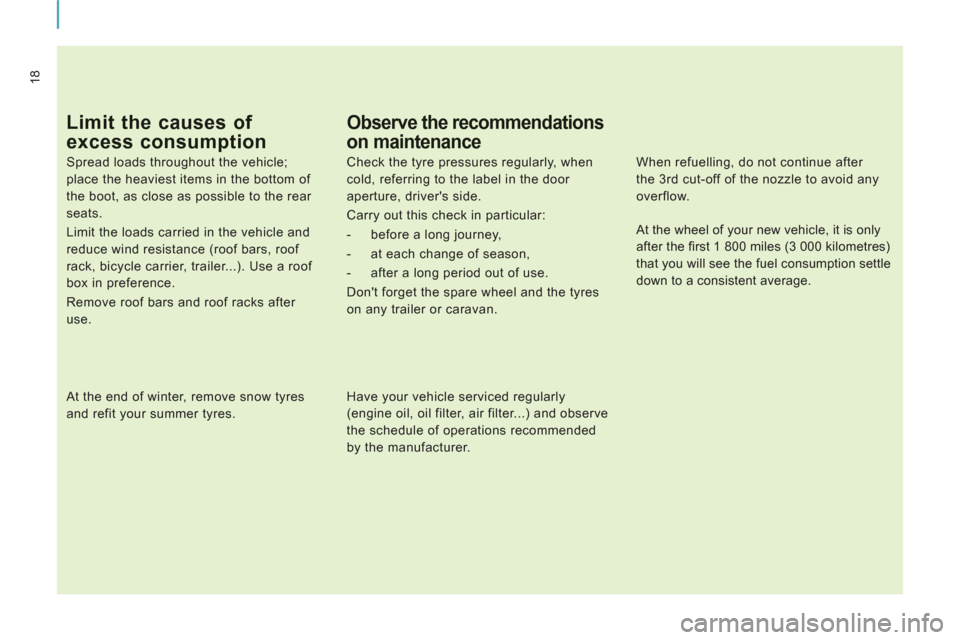
18
Limit the causes of
excess consumption
Spread loads throughout the vehicle;
place the heaviest items in the bottom of
the boot, as close as possible to the rear
seats.
Limit the loads carried in the vehicle and
reduce wind resistance (roof bars, roof
rack, bicycle carrier, trailer...). Use a roof
box in preference.
Remove roof bars and roof racks after
use.
At the end of winter, remove snow tyres
and refit your summer tyres.
Observe the recommendations
on maintenance
Check the tyre pressures regularly, when
cold, referring to the label in the door
aperture, driver's side.
Carry out this check in particular:
- before a long journey,
- at each change of season,
- after a long period out of use.
Don't forget the spare wheel and the tyres
on any trailer or caravan.
Have your vehicle serviced regularly
(engine oil, oil filter, air filter...) and observe
the schedule of operations recommended
by the manufacturer.
When refuelling, do not continue after
the 3 rd cut-off of the nozzle to avoid any
overflow.
At the wheel of your new vehicle, it is only
after the fi rst 1 800 miles (3 000 kilometres)
that you will see the fuel consumption settle
down to a consistent average.